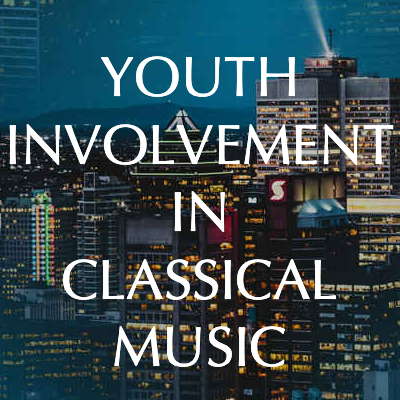- Peter Prier
- Piccinni
- Kamilló Lendvay
- Dame Janet Baker
- Aubrey Bowman
- Bliss: Miracle in the Gorbals
- Gaynor Keeble
- Elizabeth Younan
 VIDEO PODCAST: John Dante Prevedini leads a discussion about Youth Involvement in Classical Music - this specially extended illustrated feature includes contributions from Christopher Morley, Gerald Fenech, Halida Dinova, Patricia Spencer and Roderic Dunnett.
VIDEO PODCAST: John Dante Prevedini leads a discussion about Youth Involvement in Classical Music - this specially extended illustrated feature includes contributions from Christopher Morley, Gerald Fenech, Halida Dinova, Patricia Spencer and Roderic Dunnett.
 DISCUSSION: John Dante Prevedini leads a discussion about Music and the Visual World, including contributions from Celia Craig, Halida Dinova and Yekaterina Lebedeva.
DISCUSSION: John Dante Prevedini leads a discussion about Music and the Visual World, including contributions from Celia Craig, Halida Dinova and Yekaterina Lebedeva.
Giuseppe Tartini
Italian Baroque composer and violinist Giuseppe Tartini was born in Piran (now in Slovenia) in the Republic of Venice on 8 April 1692. His parents probably wanted him to become a Franciscan friar, and he received his initial musical training and began learning violin during this period. Later, he studied law in Padua and then music in Assisi.
After much practice, his skill as a violinist improved greatly and in 1721 he became a Maestro di Cappella in Padua. He worked in Prague (1723-25) and in 1726 founded a violin school which attracted students from across Europe.
Tartini died in Padua on 26 February 1770, leaving us with much music, including the famous Devil's Trill Sonata (Violin Sonata in G, B.g5), and also with a theoretical treatise on 'sum and difference tones' and their application in the intonation of double-stops on string instruments.
A selection of articles about Giuseppe Tartini
CD Spotlight. Challenges Aplenty - Music by Francesco Veracini, strongly recommended by Gerald Fenech. '... Federico Guglielmo rises to the occasion with an awareness that is enthusiastically sensitive ...'
CD Spotlight. Vibrantly Glowing Renditions - Virtuosic eighteenth century Italian violin concertos inspire Gerald Fenech. 'Čičić ... surmounts all the monstrous challenges with prodigious dexterity.'
CD Spotlight. A Good Anthology - The story of Dido, Queen of Carthage, as seen by eight Baroque composers, heard by Giuseppe Pennisi. '... this is a book and two CDs to enjoy and to make an elegant gift.'
CD Spotlight. A Certain Affinity - Extraordinary violin sonatas, recommended by Gerald Fenech. 'Auerbach and Pierce give scintillating performances throughout ...'
CD Spotlight. Splice the Mainbrace - Red Priest's 'Pirates of the Baroque', heard by the late Howard Smith. 'The foursome are outrageous, hugely entertaining, and Red Priest take no prisoners.'
CD Spotlight. Assuredly Managed - Baroque premieres, heard by Howard Smith. '... Udagawa reveals its melodic character to the full.'

